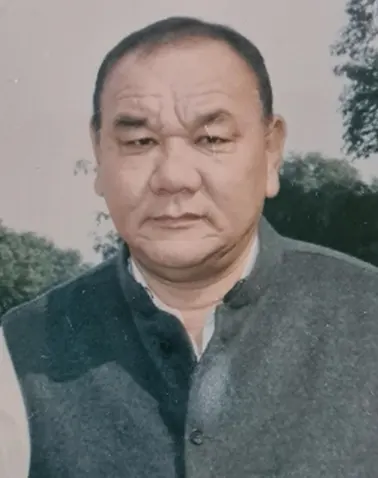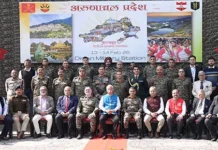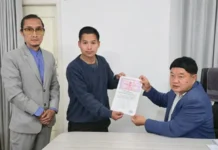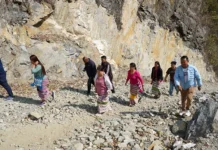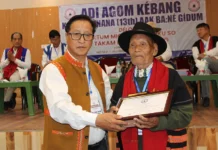[ Jigmi Choden, Wangdi Gyalpo & Tenzin Yangki ]
With the heaviest of hearts, we inform about the demise of former minister Thupten Tempa in the late evening of 7 October, 2022, in Itanagar.
Born in Khrimu village in Tawang district to late Rinchin Dhondup popularly known as ‘Nyerpa Khow’, and late Tsering Yangchin, he was a beloved addition to a family of six brothers and four sisters.
His formative school education was in Kalimpong, Shimla, Bomdila, and Tawang. He graduated from St Joseph’s College in Darjeeling, and went on to acquire his MA and MPhil degrees from Jawaharlal Nehru University (JNU) in New Delhi.
In the university, he ventured into student politics as the vice president of the All Arunachal Pradesh Students’ Union and was a founding member of the Arunachal Students’ Union Delhi.
He went on to serve in the Indian Revenue Service and the Indian Administrative Service. However, his true calling was in active politics, following the footsteps of his father Nyerpa Khow – the first political assistant in Tawang, who was instrumental in bringing the Tawang region under Indian rule. For this, the late Major Bob Khathing continued to visit the ancestral home of Nyerpa Khow in Tsumbitse until 1985. Incidentally, late Major Bob Khathing’s final interview to the AIR, Tawang was conducted by Papa, owing to longstanding relations with the family.
He found immediate success in electoral politics and served Tawang constituency for three consecutive terms from 1990-2004, serving as a cabinet minister for all three terms under chief ministers Gegong Apang and Mukut Mithi.
In his first term, he held the portfolio of rural works, rural development and planning. In his second term, he held the portfolio of tourism, planning, urban development, and finance. In his third term, he held the portfolio of planning & urban development, rural works, panchayat, election, and economics & statistics.
During his tenure, he spearheaded the restoration work of the Gaden Namgyal Lhatse monastery. He held a vision for the institute to be not only a religious site but also a centre for learning. To this effect, he initiated the common mess to relieve younger monks from domestic duties and devote greater time to learning.
In his stint as the chairman, Resource Mobilisation (2010-14), he pushed consistently for the digitisation of the monastery’s age-old manuscripts and ancient Buddhist scripture. He initiated the corpus fund for the Tawang monastery along with the fund for library and museum development, which has seen completion today.
In his term, His Holiness the 14th Dalai Lama paid two visits to Tawang.
His tenure in public works is remembered to this day for not only streamlining the department per civil list seniority but also developing the capital region connectivity, especially through construction of the Jollang road.
Education was the leitmotif of his developmental plan. His first successes came with the launch of schools. He introduced Jawahar Navodaya Vidyalaya and Vivekananda Kendriya Vidyalaya in Kitpi, and Kendra Vidyalaya. He was also instrumental in seeing through the start of the Monyul Vidya Niketan.
In personal conversation, he recounted the incident of students of Shyo village being unable to afford textbooks for the lack of scheduled tribe (ST) status.
Colleagues recount how he spearheaded and single-handedly researched evidence linking Shyo village to the Tawang monastery, establishing a pre-independence link. He spoke for hours on end at cabinet meetings, armed with steady facts and well-researched archives, and finally met success when 90 families of Shyo village were granted ST status.
His political acumen was defined by a dedication to the cause of equality, fraternity, and justice. Papa often talked of his two gurus – first and foremost His Holiness the 14th Dalai Lama, and second, Babasaheb Ambedkar. A staunch Ambedkarite, his final foray in electoral politics in 2019 had a singular message – ‘know your constitution’. He took to campaigning through messages for the youth against electoral malpractice and for genuine democracy.
Apart from his interest in politics, he remained an active proponent of traditional culture and heritage. He started the Tawang Social Cultural Literary Society, whose plantation drive at the Tawang monastery has now transformed into a lush green forest – also protecting the delicate geophysical structure from landslide vulnerabilities. He sought to promote the rich heritage of Tawang and established the still-running Buddha Mahotsav (now renamed Tawang Festival).
In his final years, he stuck by one dominating facet – an eternal student. We were delighted to see him graduate with a masters in Buddhist philosophy this year.
In public life, he was often praised for his keen intellect, steadfast commitment to the cause of justice, administrative acumen, and leadership. He was all that and more. Papa was our friend, guide, and philosopher. He was a lifelong learner, a footballer with a killer corner kick, and above all,, the funniest man in the room. To know him has been to love him.
Papa, it has truly been an honour to be by your side. We pray for your swift rebirth in a pious household.
Former colleagues, friends, and well-wishers may visit the residence Park View at Niti Vihar-Mowb II Itanagar by 10 October to pay last respects and affection before the final rites in his native Tawang. (The contributors are family members of late Thupten Tempa)

